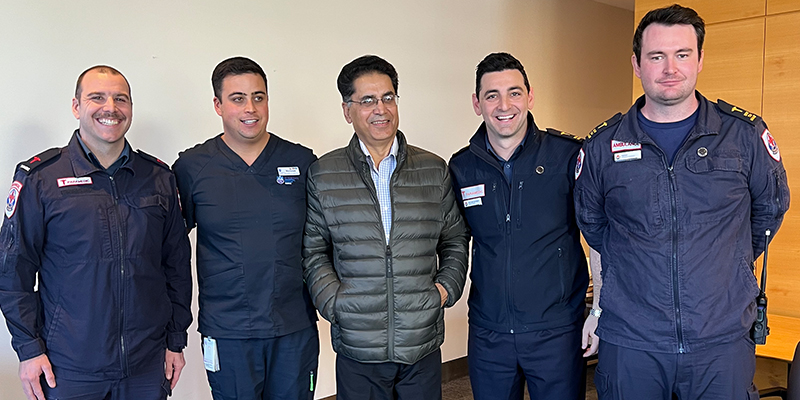Grateful for a second chance
August 16, 2023 | in Community News
A cardiac arrest survivor reunited with some of his first responders this week to spread lifesaving messages about cardiopulmonary resuscitation (CPR) and how to use an automated external defibrillator (AED).
A normal day in February this year quickly became life threatening for 60-year-old Shakeel Ahmad when he suddenly collapsed at Parliament Station on his way home from work.
Bystanders and nearby St Vincent’s Hospital Melbourne nurses immediately started the chain of survival, performing CPR and using an AED to shock Shakeel twice while Triple Zero (000) was called.

(L-R) Ambulance Victoria (AV) Paramedic Ward Jongebloed, St Vincent’s Hospital Melbourne Practice Development Nurse Nicholas Nieuwoudt, cardiac arrest survivor Shakeel Ahmad, AV Metropolitan Regional Director Michael Georgiou and AV Metropolitan Community Engagement Liaison Coordinator Adrian Martin.
Three Ambulance Victoria (AV) staff also responded after receiving an alert on the GoodSAM app.
The father of two was then transported by paramedics to St Vincent’s Hospital Melbourne where he stayed for nine days.
AV Metropolitan Regional Director Michael Georgiou said Shakeel’s experience was a great example of how early bystander intervention can help save lives.
“We know about 20 Victorians have a cardiac arrest each day and only one in 10 people survive,” Mr Georgiou said.
“Minutes matter in cardiac arrests, and when a patient receives CPR and a shock from an AED before paramedics arrive, their chance of survival increases by 70 per cent.”
Five months later, Shakeel said he is still recovering after receiving a coronary bypass and completing eight weeks of rehab.
“Everyone should know how to perform CPR and use an AED,” he said.
“I am lucky to have a second chance at life.”
St Vincent’s Hospital Melbourne Practice Development Nurse Nicholas Nieuwoudt said effective CPR and early defibrillation no doubt saved Shakeel’s life and assisted his recovery.
“It is hard to overstate the importance of defibrillators in public spaces. They are designed to be used by people with no training.
“Once you know how to perform CPR, you can have a huge impact on helping somebody who really needs it.”
Mr Georgiou said Shakeel’s experience also showed how the GoodSAM app connects patients in cardiac arrest with a nearby volunteer willing to start hands-only CPR before the ambulance arrives.
“It does not require a first aid qualification and I encourage everyone over the age of 18 to sign up,” he said.
